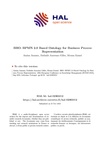User:WikiSysop/Information Model
The Best Practices Wiki Information Model
The Best Practices Wiki Information Model is fundamental to identify (a) semantic tags to markup Best Practices essays (b) semantic classes for Practice, Policy, Procedure and Process models, of prime interest (c) classes for Act, Action, Activity and Task that are the detailed enumerated steps for a "method" that achieves a particularly useful objective.
Semantic Models in Context
mw:Extension:SemanticTasks: provides email task notifications and reminders. This application concerns assignment of People to tasks, not a focus here though BestPracticesWiki.net can provide the task descriptions to such an application.
References
- [https:\\kissflow.com/workflow/bpm/business-process/ The Extensive Guide to Business Processes]
- ERP Readiness Series: The Four Core Processes Every Business Should Document
Glossary
- Context: the circumstances that form the setting for an event, statement, or idea, and in terms of which it can be fully understood and assessed.
- Essay: a short piece of writing on a particular subject.
- Recipe: a set of instructions (such as) for preparing a particular dish, including a list of ingredients required.
- Use Case: a written description of how users will perform tasks. It outlines, from a user's point of view, a system's behavior as it responds to a request. Each use case is represented as a sequence of simple steps, beginning with a user's goal and ending when that goal is fulfilled. www.usability.gov
- Act: a thing done; a deed.
- Action: the (fact or) process of doing something, typically to achieve an aim.
- Activity: the condition in which things are happening or being done. A thing that a person or group does or has done.
- Actor: anyone or anything that performs a behavior (who is using the system).
- Event: a thing that happens, especially one of importance.
- Task: a piece of work to be done or undertaken.
- Formula: a method, statement, or procedure for achieving something, especially reconciling different aims or positions.
- Method: a particular form of procedure for accomplishing or approaching something, especially a systematic or established one.
- Practice: the customary, habitual, or expected procedure or way of doing of something.
- Policy: a course or principle of action adopted or proposed by a government, party, business, or individual.
- Procedure: an established or official way of doing something.
- Process: a series of actions or steps taken in order to achieve a particular end.
Ontology Design Elements
Class Hierarchy
Ontology Statement
<owl:Ontology id='WikiSysop/Information Model'>
</owl:Ontology>
<owl:Ontology>
Category:Act/rdf
Category:Action/rdf
Category:Activity/rdf
Category:Agent/rdf
Category:Belief/rdf
Category:Benefit/rdf
Category:Context/rdf
Category:Essay/rdf
Category:Event/rdf
Category:Formula/rdf
Category:Heading/rdf
Category:Idea/rdf
Category:Inflow/rdf
Category:Institution/rdf
Category:Method/rdf
Category:Operation/rdf
Category:Outflow/rdf
Category:Parameter/rdf
Category:Place/rdf
Category:Person/rdf
Category:Policy/rdf
Category:Practice/rdf
Category:Procedure/rdf
Category:Process/rdf
Category:Publication/rdf
Category:Reason/rdf
Category:Result/rdf
Category:Risk/rdf
Category:Sink/rdf
Category:State/rdf
Category:Statement/rdf
Category:Task/rdf
Category:Trigger/rdf
Category:Add/rdf
Category:Change/rdf
Category:Delete/rdf
Category:Query/rdf
Category:Reply/rdf
</owl:Ontology>
